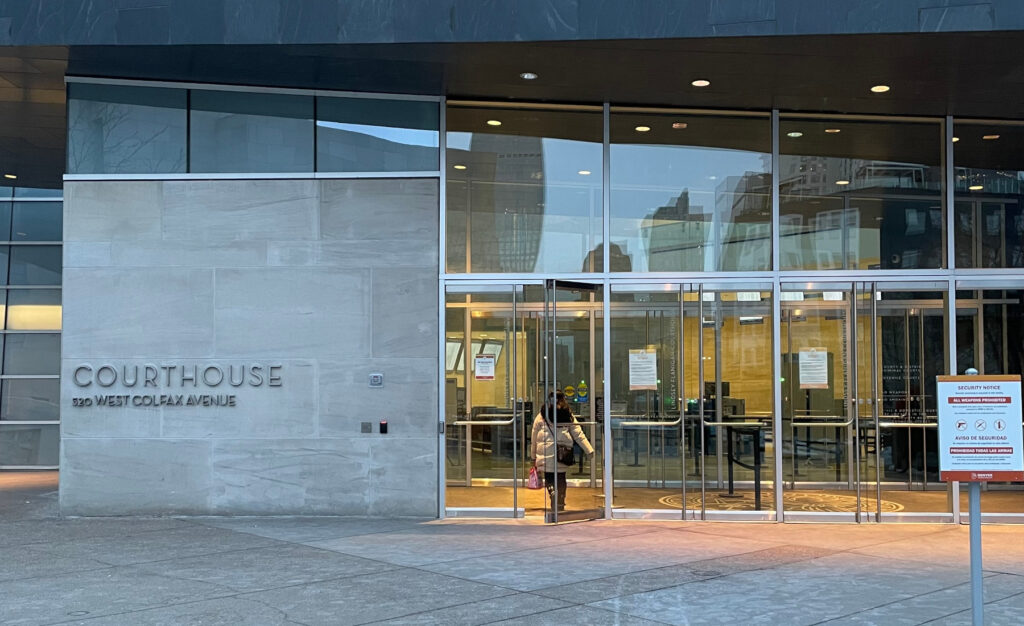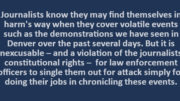By Jeffrey A. Roberts
CFOIC Executive Director
Colorado’s judicial branch proposed two new chief justice directives on virtual court proceedings Wednesday and asked the public to comment on them by mid-March.
“It is a forgone conclusion that virtual proceedings are here to stay, and they provide a tremendous benefit in many respects,” Colorado Supreme Court Chief Justice Brian Boatright said in a statement posted online. “Before the Court takes any action regarding this valuable public resource, we feel it is critically important to hear from all stakeholders who have now had nearly three years to adapt to this new environment and technology.”

The Colorado Freedom of Information Coalition last month reported on the policy effort, which has been led by Eighth Judicial District Chief Judge Susan Blanco and Fourth Judicial District Chief Judge William Bain. Meanwhile, state Rep. Elisabeth Epps, D-Denver, introduced House Bill 23-1182, which would require all courts to livestream criminal proceedings held in open court unless they are not equipped to do so.
One of the draft chief justice directives addresses whether parties involved in judicial proceedings must appear in person or remotely in state trial courts. The other sets rules for livestreaming criminal proceedings, which many courts implemented after the COVID-19 pandemic hit in early 2020.
It is now up to each judge to decide whether proceedings are broadcast to the public using Webex or another videoconferencing platform. Many judges use the technology, but some do not and not every courtroom is equipped for virtual justice. Bandwidth issues make it challenging in certain jurisdictions for multiple courts to stream simultaneously.
The proposed livestreaming rule lists several reasons why Colorado courts did not historically let the public watch proceedings online: the sequestration of witnesses; the need to protect victims, especially those who have been sexually assaulted or subject to domestic violence; and the need to protect defendants from retaliation.
“This Directive is created to provide a more uniform process for the live streaming of criminal court proceedings in Colorado,” it says. The rule “seeks to open most of the day-to-day business of Colorado’s criminal courts to the public, while allowing each trial court the discretion not to live stream proceedings where the public’s interest is outweighed by the interests of the parties and witnesses.”
The draft directive requires judges to provide livestreaming “during initial bond setting proceedings and any other criminal proceedings,” except for evidentiary hearings, trials, bench conferences, communications between counsel and clients, in camera hearings and problem-solving dockets.
It also lets judges expand or limit livestreaming “at any time before or during a proceeding” after considering factors such as whether livestreaming would: interfere with a fair trial; create an adverse consequence to a party, attorney, victim or witness; or detract from the “solemnity, decorum, and dignity” of the court.
The proposed policy prohibits the audio or video recording of livestreamed court proceedings, as well as the taking of screenshots or photos, without a court’s express authorization, and violators could be held in contempt.
The livestreaming policy would apply to equipped courtrooms that also have “sufficient staff to initiate and monitor” a livestream.
The Colorado Supreme Court wants comments on the two directives emailed by March 15.
HB 23-1182 will likely be heard in the House Judiciary Committee later this month.
Follow the Colorado Freedom of Information Coalition on Twitter @CoFOIC. Like CFOIC’s Facebook page. Do you appreciate the information and resources provided by CFOIC? Please consider making a tax-deductible donation.




